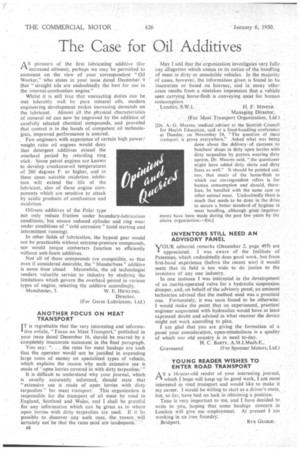The Case for Oil Additives
Page 42

If you've noticed an error in this article please click here to report it so we can fix it.
S pioneers of thefirst lubricating additive (for " increased oiliness), perhaps we may be permitted to comment on the view of your correspondent " Oil Worker," who states in your issue dated December 9 that "straight oils are undoubtedly the best for use in the internal-combustion engine."
Whilst it is still true that unexacting duties can be. met tolerably well by pure mineral oils, modern engineering development makes increasing demands on the lubricant. Almost all the physical characteristics of mineral oil can now be improved by the addition of carefully selected chemical compounds, and provided that control is in the hands of competent ail technolo
gists, improved performance is assured. •
, Few engineers with experience of certain high power/ weight ratio oil engines would deny that detergent additives extend the overhaul period by retarding ring stick. Some petrol engines are known to develop crankcase-oil temperatures of 260 degrees F. or higher, and in these cases suitable oxidation inhibitors will extend the life of the lubricant, also of those engine cornponents which are sensitive to attack by acidic products of combustion and
oxidation. •
Oiliness additives of the Polar type not only reduce friction under boundary-lubrication conditions,but ensure reduced cylinder and ring wear under conditions of "cold corrosion " (cold starting and intermittent running).
In other fields of lubrication; the hypoid gear would not be practicable without extreme-pressure compounds, nor would torque converters function so efficiently without anti-foam additives.
Not all of these compounds are compatible, so that even if considered desirable; the " blunderbuss " additive is some time ahead. Meanwhile, the oil technologist renders valuable service to industry by studying the limitations which govern the overhaul period in various types of engine, selecting the additive accordingly.
Manchester, 3, W. E. HICKLING.
Director, (For Germ Lubricants, Ltd.) ANOTHER FOCUS ON MEAT TRANSPORT
I T is regrettable that the very interesting and informa
tive article, " Focus on Meat Transport," published in your issue dated December 16, should be marred by a completely inaccurate statement in the final paragraph.
You say: ". . . the rates for meat haulage arc such that the operator would not be justified in expending large sums of money on specialized types of vehicle, which explains the reason why such extensive use is made of 'open lorries covered in with dirty tarpaulins'"
It is difficult to understand why your journal, which is usually accurately informed, should state that "extensive use is made of open lorries •with dirty tarpaulins" for meat transport. This organization is responsible for the transport of all meat by road in England, Scotland andWales, and I shall be grateful for •-any information which can be given as to where open lorries with dirty tarpaulins are used. If it be possible to discover any such case, theeason• will certainly not be that the rates paid are inadequate.
n8
May I add that the organization investigates very fully any allegation which comes to its notice of the handling of meat in dirty or unsuitable vehicles. In the majority of cases, however, the information given is found to be inaccurate or based on hearsay, and in many other cases results from a mistaken impression that .a vehicle seen carrying horse-flesh -is conveying meat for human consumption.
London. &WA. • . H. F. MuvrER.
• Managing Director, • (For. Meat :Transport Organization, Ltd.) [Dr. A.-G.. Mearns; medical adviser to the Scottish Counil
for Health Education, said at a food-handling conference
at Dundee, on November 24, "The question of meat transport. is grave everywhere.' Asked what was being done about the delivery • of carcases . to butchers' shops in dirty open lorries with dirty tarpaulins by porters wearing dirty aprons, Dr. Mearns said, the questioner might have added dirty shirts and dirty faces as well." It -should he pointed out, too, that much of the horse-flesh to which our correspondent refers is for human consumption and Should, therefore, be handled with the same care as °Ibex animal meat. Undoubtedly there is much that needs .to be done in the drive to secure -a better standard of hygiene in meat handling, although great iimprOve
rnents have been made during the past few years by the abOve organization.—Er.]
INVENTORS STILL NEED AN ADVISORY PANEL 'TOUR editorial remarks (December 2, page 495) are
appreciated. I was aware of the Institute of Patentees, which undoubtedly does good work, but from first-hand experience (before the recent war) it would seem that its field is too wide to do justice to the inventors of any one industry.
In one instance I was interested in the development of an inertia-operated valve for a hydraulic suspension damper, and, on behalf of the advisory panel, an eminent technician advised that the method used was a practical one. Fortunately, it was soon found to be otherwise. I would make the point that an experienced, practical engineer acquainted with hydraulics would have at least expressed doubt and advised in what manner the device might not work according to plan.
I am glad that you are giving the formation of a panel Your consideration, open-mindedness is a quality of which our old country is in need to-day.
H. C. Burry, A.M.I.Mech.E., Gravesend (For Spooner Motors, Ltd.)
YOUNG READER WISHES'TO ENTER ROAD TRANSPORT
S a 16-year-old reader of your interesting journal, i-k which I hope will keep up its good work, I am: most interested in road transport and would like to make it my career. I would be willing to start as a driver's mate, but, so far, have had no luck in obtaining a position. Time is very important to me, and I have decided to write to you, hoping that some haulage concern in London will give me employment. At present I am
working in an iron foundry. •
Bridport. REX GLIDGE.




























































































